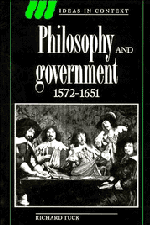7 - Thomas Hobbes
Published online by Cambridge University Press: 05 July 2011
Summary
THE ORIGIN OF HOBBES'S EARLY PHILOSOPHY
It is to Hobbes that we must turn to see many of the themes which we have considered in this work come to some kind of fruition. Both in his general philosophical writings and in his political theory he engaged with the central issues of the previous generation, and in particular with scepticism and its remedy. It is reasonable to say ‘the previous generation’, and yet Hobbes was only five years younger than Grotius; but whereas the Dutchman was an intellectual prodigy whose first publication appeared before he was twenty, Hobbes was forty-one when he first published a book. Moreover, not until he was nearly fifty do we have any clear evidence of his philosophical views. As it happened, this late development was no barrier to great productivity, for Hobbes was to live another fortyone years, during which he remained astonishingly active intellectually. But the result of this curious life history is that while he was deeply imbued with all the attitudes of the early seventeenth century, he was able to distance himself from them in various ways when he commited himself to print.
His background, unlike Grotius but like Selden, was in a family far removed from expectations of political power or influence. His mother was of ‘the middling sort’, and his father was a survival from an earlier age, an uneducated clergyman who acted as curate to the vicar of Westport in the town of Malmesbury (Wiltshire), with an annual income of probably even less than that of Selden's father (see Rogow 1986 pp. 24–9).
- Type
- Chapter
- Information
- Philosophy and Government 1572–1651 , pp. 279 - 345Publisher: Cambridge University PressPrint publication year: 1993

